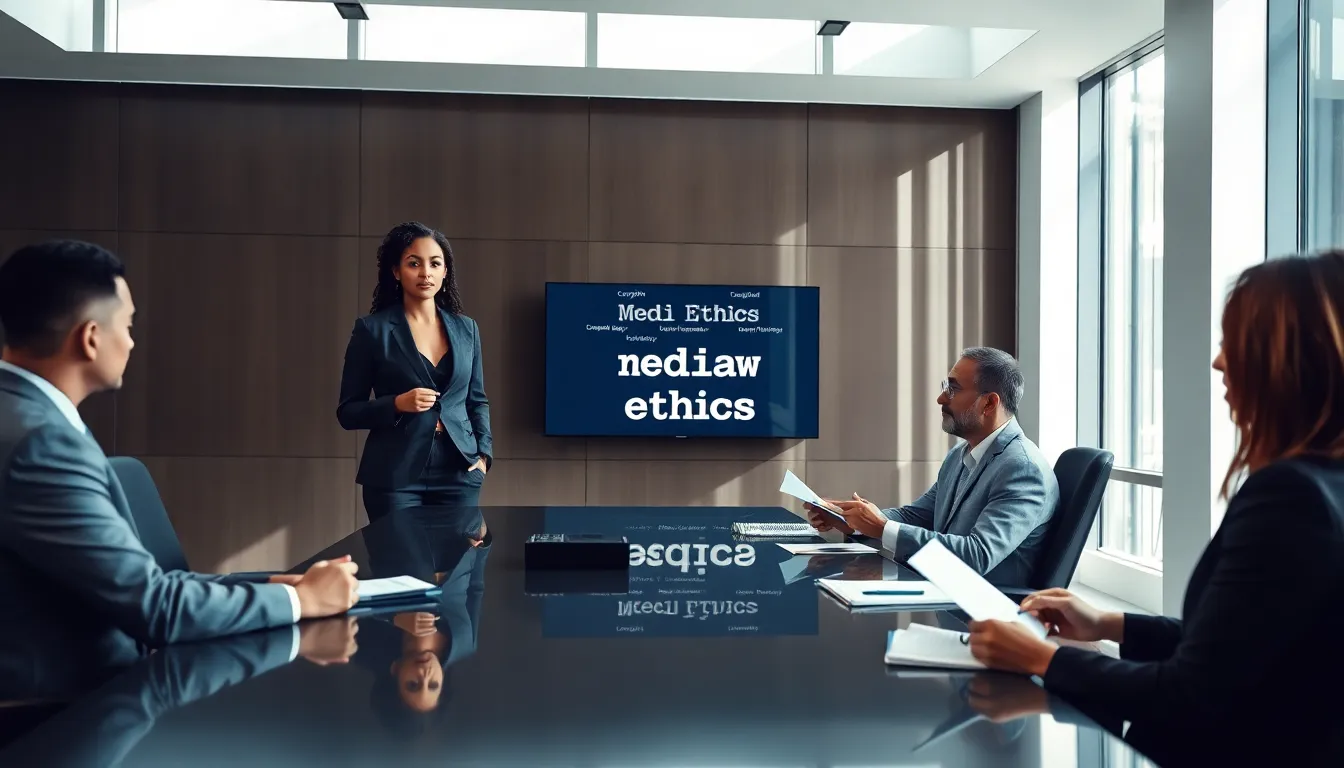Table of Contents
ToggleEver thought media was just about sensational headlines and clickbait? Think again. Media law and ethics are at the heart of responsible journalism, and understanding them is crucial for anyone involved in the industry. Nobody wants to end up dodging lawsuits or facing a moral crisis after posting an article. Let’s jump into the labyrinth of media laws and ethical practices, and learn how to handle the legalities without breaking a sweat (or the law).
Understanding Media Law

Understanding media law is the first step toward becoming a responsible media professional. It’s not just about what you can publish but also what you cannot. Media laws serve as the framework within which journalists operate, protecting both the rights of the individual and the public’s right to know.
Types Of Media Laws
Media laws can be broadly categorized into several types. These include:
- Copyright Law
- Defamation Law
- Privacy Laws
- Broadcasting Regulations
These laws are designed to protect creators, regulate content, and ensure the responsible use of media, which keeps the public interest in mind.
Copyright Law
Copyright law protects original works of authorship, including articles, photos, and videos. Creators have the exclusive right to distribute, reproduce, and perform their works. Failing to respect copyright can lead to nasty legal battles, so understanding fair use and the limits of copyright is essential for journalists.
Defamation Law
Defamation occurs when false information is presented as a fact that injures a party’s reputation. There are two types: slander (spoken) and libel (written). In media, it’s vital to ensure that your reports are well-researched and accurate to avoid costly lawsuits.
Privacy Laws
Privacy laws protect individuals from unwanted intrusions into their personal lives. Journalists often find themselves toeing a fine line between the public’s right to know and an individual’s right to privacy. Knowing how these laws apply can help avoid legal ramifications while still delivering important news.
The Role Of Regulatory Bodies
Regulatory bodies play a vital role in upholding media law. They ensure compliance and act as a mediator in conflicts. In the U.S., the Federal Communications Commission (FCC) oversees broadcasting regulations, while the Federal Trade Commission (FTC) handles advertising practices. These bodies help provide a check and balance system in the media landscape, enforcing standards and ethical practices that hold media outlets accountable.
Ethics In Media Practices
Ethics in media practices is what separates responsible journalists from their reckless counterparts. When one publishes a story, they must adhere to established standards that prioritize truth and fairness, ensuring that public trust is maintained.
Fundamental Ethical Principles
At the core of journalistic ethics are some fundamental principles that guide professionals. These include the commitment to seek truth, report information responsibly, and act in the public interest. Adhering to these guidelines not only builds credibility but also fosters trust.
Truth And Accuracy
Misinformation can be harmful and damaging. Reporters must strive for accuracy and verify information before publication. This often involves several layers of fact-checking and cross-referencing sources, which can sometimes be an uphill battle, but it’s essential to maintain journalistic integrity.
Fairness And Impartiality
Fairness means covering stories from multiple angles, treating all sides with balanced attention. Impartiality requires journalists to be objective, free from biases that could cloud reporting. This commitment to fairness ensures that diverse perspectives are represented, eventually enriching public discourse.
Accountability And Transparency
Finally, accountability and transparency are pillars of ethical journalism. Journalists should be accountable for their work, correcting errors when they occur and being transparent about their sourcing and methods. This fosters an environment of trust and credibility, allowing the media to operate effectively in society.
Balancing Ethics And Legal Obligations
Balancing ethics and legal obligations can feel like walking a tightrope. While journalists have legal rights to report, they also owe it to their audiences and subjects to maintain ethical standards. For instance, a journalist may legally obtain information under the Freedom of Information Act, yet if that information invades a person’s privacy or misrepresents the truth, ethical considerations come into play. It’s crucial to navigate this delicate balance carefully: doing so not only minimizes legal risks but also upholds the integrity of the media.
Case Studies Of Media Law And Ethics Violations
Examining case studies can enlighten us about media law and ethics violations. A well-known example is the scandal involving News of the World, which involved the illegal phone tapping of individuals for sensational stories. This not only led to legal consequences but also a significant loss of trust in journalism.
Another case includes the infamous episode of Janet Cooke, who won a Pulitzer Prize for a fabricated story about an eight-year-old heroin addict. It later came to light that the story was completely made up, resulting in her resignation and raising serious doubts about the integrity of journalism.
These instances serve as cautionary tales, reminding journalists of the vital importance of both legal compliance and ethical duty.




